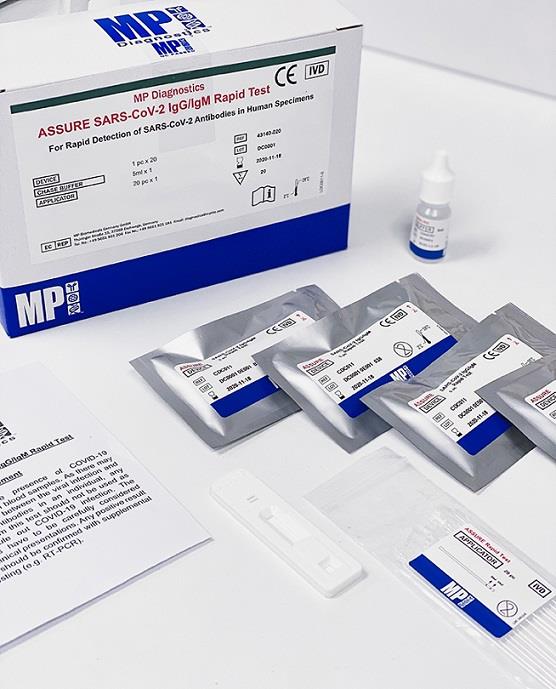SG develops test kit that detects exposure to COVID-19 in 15 min




 ASSURE rapid test kit by MP Biomedicals and A*STAR
ASSURE rapid test kit by MP Biomedicals and A*STARThe Agency for Science, Technology, and Research (A*Star) in Singapore and diagnostic corporation MP Biomedicals Asia Pacific have recently developed a rapid antibody test kit that can identify individuals who have been exposed to the novel coronavirus disease (COVID-19) within 15 minutes.
The test kit, named ASSURE, detects IgG and IgM antibodies, which are produced by the human immune system to combat SARS-CoV-2, the virus that causes COVID-19. [https://www.news-medical.net/news/20200725/MP-Biomedicals-and-ASTAR-jointly-develop-rapid-antibody-test-kit-for-COVID-19.aspx]
"We identified a human monoclonal antibody which binds to SARS-CoV-2, and it proved to be useful during the early development phase of this rapid test kit," Tan Yee Joo, joint senior principal investigator from the Institute of Molecular & Cell Biology, A*STAR, and associate professor at National University of Singapore's Yong Loo Lin School of Medicine, said in a press statement.
ASSURE, however, is not meant to replace polymerase chain reaction (PCR) tests but is particularly useful in determining whether an individual has been previously exposed to the coronavirus. The rapid antibody test kit can identify asymptomatic patients or those with mild symptoms who did not undergo real-time PCR testing. [https://www.straitstimes.com/singapore/health/kit-to-detect-exposure-to-virus-in-15min-co-developed-by-astar]
“[R]apid serology tests including ASSURE rapid antibody test kit should not be used in the clinical diagnosis of COVID-19 infections or in the evaluation of persons with acute respiratory symptoms, especially within the first 14 days of illness,” the researchers clarified. “This is to avoid giving patients false reassurance that they do not have the infection, arising from a negative result.”
ASSURE is a point-of-care kit, so patients can be tested and may receive the results within 15 min at clinics where the kit is deployed, without waiting for a laboratory to process them. It works in a manner similar to a pregnancy test, in which a visible line will appear if antibodies are present.
The technology behind ASSURE utilizes synthetic SARS-CoV-2 proteins that bind to the IgG and IgM antibodies if they are present in the specimen samples of human blood, plasma, or serum. MP Biomedicals developed the product based on their lateral flow platform, while A*STAR’s Diagnostic Development (DxD) Hub co-developed the validation protocols and quality controls. [https://www.biospectrumasia.com/news/91/16376/mp-biomedicals-and-astar-co-develop-rapid-antibody-test-kit-for-sars-cov-2.html]
The rapid antibody test kit was evaluated by the Department of Laboratory Medicine at National University Hospital, demonstrating positive results for both serum and whole blood. It has a sensitivity comparable to that of commercial immunoassays when tested with convalescent blood from COVID-19 patients who have recovered in the clinic.
“The development and manufacture of ASSURE is a successful collaboration between MP Biomedicals and A*STAR through tremendous joint work,” Delynn Xu, senior R&D manager at MP Biomedicals, said in a press statement. “We are not the first one in the market, but chasing the best performance is always our primary goal.”
ASSURE has been granted provisional authorization by the Health Sciences Authority for use in Singapore. It has also been distributed to regions, including Europe, Africa, and South America. MP Biomedicals is planning to file for emergency use authorization from the US Food and Drug Administration.
“It is absolutely critical that we continue to transfer R&D know-how to biotech companies, to scale up and let more labs tap on this diagnostics test kit to screen patients,” Sidney Yee, CEO of DxD Hub, A*STAR, said in a press statement. “This rapid test kit for COVID-19 … will complement global efforts to develop more efficient diagnostics, as the COVID-19 situation continues to evolve.”